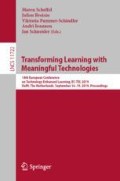Abstract
This article presents a large scale quasi-experiment to introduce primary school pupils to Computational Thinking. The aim is to enhance their capability to spot repetitive patterns and to express them as loops. Unplugged and plugged-in activities are used to train the pupils. Trace analysis and pre and post questionnaires were used to measure the impact of the intervention. This article deals with the 2018 session involving 20 classes. The results show a positive impact of the activities and give information about the skills acquired.
Access this chapter
Tax calculation will be finalised at checkout
Purchases are for personal use only
Notes
- 1.
Association that organizes the Bebras computer science challenge in France (http://www.castor-informatique.fr).
- 2.
we have lost some logs due to a technical problem.
References
Brennan, K., Resnick, M.: New frameworks for studying and assessing the development of computational thinking. In: Annual American Educational Research Association meeting, Vancouver, BC, Canada, pp. 1–25 (2012)
Bruner, J.: Towards a Theory of Instruction. Harvard University Press, Cambridge (1974)
Ching, Y.H., Hsu, Y.C., Baldwin, S.: Developing computational thinking with educational technologies for young learners. TechTrends 62(6), 563–573 (2018). https://doi.org/10.1007/s11528-018-0292-7
Gouws, L., Bradshaw, K., Wentworth, P.: Computational thinking in educational activities. In: Proceedings of the 18th ACM Conference on Innovation and Technology in Computer Science Education - ITiCSE 2013, p. 10 (2013). https://doi.org/10.1145/2462476.2466518
Grover, S., Cooper, S., Pea, R.: Assessing computational learning in K-12. In: Proceedings of the 2014 Conference on Innovation and Technology in Computer Science Education - ITiCSE 2014, pp. 57–62 (2014). https://doi.org/10.1145/2591708.2591713. http://dl.acm.org/citation.cfm?doid=2591708.2591713
Knochel, A.D., Patton, R.M.: If art education then critical digital making: computational thinking and creative code. Stud. Art Educ.: J. Issues Res. 57(1), 21–38 (2015)
Papert, S.: Mindstorms: Children, Computers, and Powerful Ideas. Basic Books, Inc., New York (1980)
Sabitzer, B., Jarnig, M.: Computational thinking through modeling in language lessons. In: IEEE Global Engineering Education Conference (EDUCON), pp. 1913–1919 (2018)
Seiter, L., Foreman, B.: Modeling the learning progressions of computational thinking of primary grade students. In: Proceedings of the Ninth Annual International ACM Conference on International Computing Education Research, pp. 59–66 (2013). https://doi.org/10.1145/2493394.2493403
Snow, E., Tate, C., Rutstein, D., Bienkowski, M.: Assessment design patterns for computational thinking practices in secondary computer science. Techniical report December, SRI International (2017)
Weintrop, D., et al.: Defining computational thinking for mathematics and science class-rooms. J. Sci. Educ. Technol. 25(1), 127–147 (2016). https://doi.org/10.1007/s10956-015-9581-5
Wing, J.M.: Computational thinking. Commun. ACM 49(3), 33–35 (2006). https://doi.org/10.1145/1118178.1118215
Acknowledgments
This work is partially funded by the EU Interreg Dig-e-Lab project. We thank the France-IOI association for providing the platform for the experiment.
Author information
Authors and Affiliations
Corresponding author
Editor information
Editors and Affiliations
Rights and permissions
Copyright information
© 2019 Springer Nature Switzerland AG
About this paper
Cite this paper
Léonard, M., Peter, Y., Secq, Y. (2019). Patterns and Loops: Early Computational Thinking. In: Scheffel, M., Broisin, J., Pammer-Schindler, V., Ioannou, A., Schneider, J. (eds) Transforming Learning with Meaningful Technologies. EC-TEL 2019. Lecture Notes in Computer Science(), vol 11722. Springer, Cham. https://doi.org/10.1007/978-3-030-29736-7_21
Download citation
DOI: https://doi.org/10.1007/978-3-030-29736-7_21
Published:
Publisher Name: Springer, Cham
Print ISBN: 978-3-030-29735-0
Online ISBN: 978-3-030-29736-7
eBook Packages: Computer ScienceComputer Science (R0)

